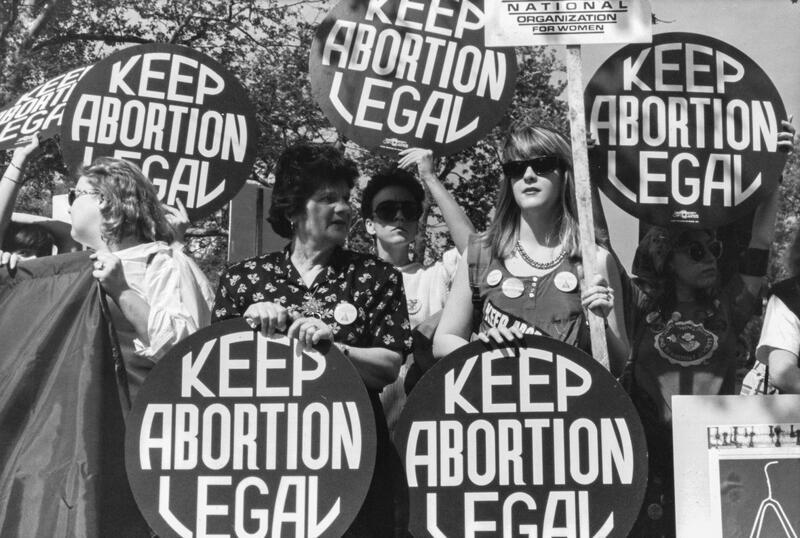Roe v. Wade is the Floor, Not the Ceiling
Justine Orlovsky-Schnitzler is JWA's politics writer.
January 22, 2021, marked 48 years of Roe v. Wade. There are familiar images, slogans, and motifs that tend to circulate around the decision’s anniversary: the young female attorneys who argued the case; the rallying cries of “never again;” coat-hangers held aloft defiantly in front of the Supreme Court.
I’m currently a board member with the Carolina Abortion Fund, a group I’ve been involved with since 2016. Abortion funds, which exist in dozens of states and major cities across the country, help to bridge the gap between legal and possible, as cost is often a hindrance to obtaining desired abortion care. Money isn’t the only barrier, of course. In 2021, abortion is governed by a byzantine system of patchwork, state-by-state restrictions. In Missouri, for example, there is currently only one operating clinic. Twenty-one states have bans against “partial-birth abortions” despite that being a non-scientific, inconsistent term that purposefully plays into partisan political beliefs about abortion care. Insurance networks rarely provide suitable coverage for abortion procedures, and many, many people lack insurance care to begin with. “Safe, legal, and rare” was coined as a slogan in 1992 by then-President Bill Clinton, a rallying cry for coalition building in a Democratic party struggling to figure out exactly how fully to embrace abortion rights. In 2021, this slogan is outdated—but it is remarkable to see the lingering effects of that messaging, nearly 30 years on.
Through my work in direct abortion funding, I have learned the importance of loudly (and proudly) identifying as pro-abortion. So much of the reproductive rights movement has been focused on reaction and defense, rather than on a proactive claiming of space and rights. Calling myself pro-abortion makes people flinch, but this is precisely why I use the term. I do not assign moral weight to the procedure; I believe everyone has a right to make the decision that is best for them about their body, and should be able to access the care they need without stigma. It is not enough to support a choice if that choice is shrouded in secrecy, shame, and unnecessary, dehumanizing roadblocks. Simply put—we cannot be afraid to use the word abortion when we talk about abortion.
I wrote my senior honors thesis about a lesser-known abortion rights case—NOW vs. Scheidler, a 1994 decision that ruled in favor of the National Organization for Women against an anti-choice demonstrator. Much of my argument rested on outlining the weaknesses of Roe; though Roe is something to be grateful for, it put abortion activists on the defensive from the moment it became law by turning responsibility over to the states. Abortion has remained a political volleyball, subject to the whims of individual governors, judges, and state lines.
Under Biden, many of us working in abortion activism are hopeful Roe can be made less vulnerable to the transition of administrations. The ultimate goal, of course, is to move from piecemeal legislation and state-specific accessibility to a national, comprehensive healthcare plan that covers abortion as a routine procedure nearly one in every three people capable of getting pregnant will have in their lifetime.
But until we see an embrace of Medicare for All, there are other issues we can tackle. The chief among these is understanding the difference between reproductive rights and reproductive justice. The latter is a framework developed by SisterSong Women of Color Reproductive Justice Collective, which argues abortion accessibility, rather than just choice, is necessary to truly eliminate barriers to bodily autonomy, safety, and dignity. Reproductive justice also broadens the conversation beyond legality and illegality of abortion: As the collective writes in its mission statement, “We believe reproductive justice is not just about abortion. Abortion access is critical, and women or color and other marginalized women also often have difficulty accessing: contraception, comprehensive sex education, STI prevention and care, alternative birth options, adequate prenatal and pregnancy care, domestic violence assistance, adequate wages to support our families, safe homes, and so much more.” Abolishing prisons is a reproductive justice issue. Eliminating student debt is a reproductive issue. Raising the minimum wage is a reproductive justice issue. Clean air, good schools, safe neighborhoods—these are reproductive justice issues. Put simply, Roe is the floor—not the ceiling.
Finally, as we begin to walk out from under the shadow of the last four years of aggressively regressive politics, it is important to remember that we have a right and an obligation as Jewish people to remain part of the national conversation about abortion. For too long, discourse has been driven by Christian fundamentalists, eager to cite cherry-picked verses and passages from shared text in support of abortion restrictions and bans. Rabbi Danya Ruttenberg has spoken and written extensively on this topic—arguing that it is crucial Jews demonstrate that abortion rights are not incompatible with our shared faith, values, or moral system. For Newsweek last summer, she and Sheila Katz, CEO of the National Council of Jewish Women, wrote: “Our tradition is clear that abortion is absolutely required when the life of the pregnant person is at risk, through the whole duration of the pregancy…This is not just a matter of Jewish law, but of Jewish values. We consider pikuach nefesh, preserving life, to be one of our most critical commandments, and, more broadly, building a just society to be of ultimate Jewish concern—and, with abortion access, safety, justice, freedom, and lives are at stake.”
It is vital to seize the momentum of the transfer of power in our highest offices to ensure abortion is an accesible right for every person who wants one, in all fifty states. And it is necessary to push back against those who claim eroding abortion rights as a universally “religious value.” I encourage everyone interested in agitating for reproductive justice from a Jewish perspective to consider participating in the Repro Shabbat events being held February 12-13, 2021, hosted by the National Council of Jewish Women and co-sponsored by the Jewish Women’s Archive (and after attending, sign-up to be a monthly sustainer for your local abortion fund). We are long overdue for a celebration of our relationship to reproductive justice, to joy, to choice, and to freedom.








Rabbi Ruttenberg's reliance on ancient texts and Rabbinical writings from the Middle Ages does not consider scientific advances as we now know a fetus suffers pain at just 5 months of pregnancy. Also, a fetus may survive out of the mother's womb after 6 months of pregnancy. Your position on abortion rights until birth seems cruel and inhumane.